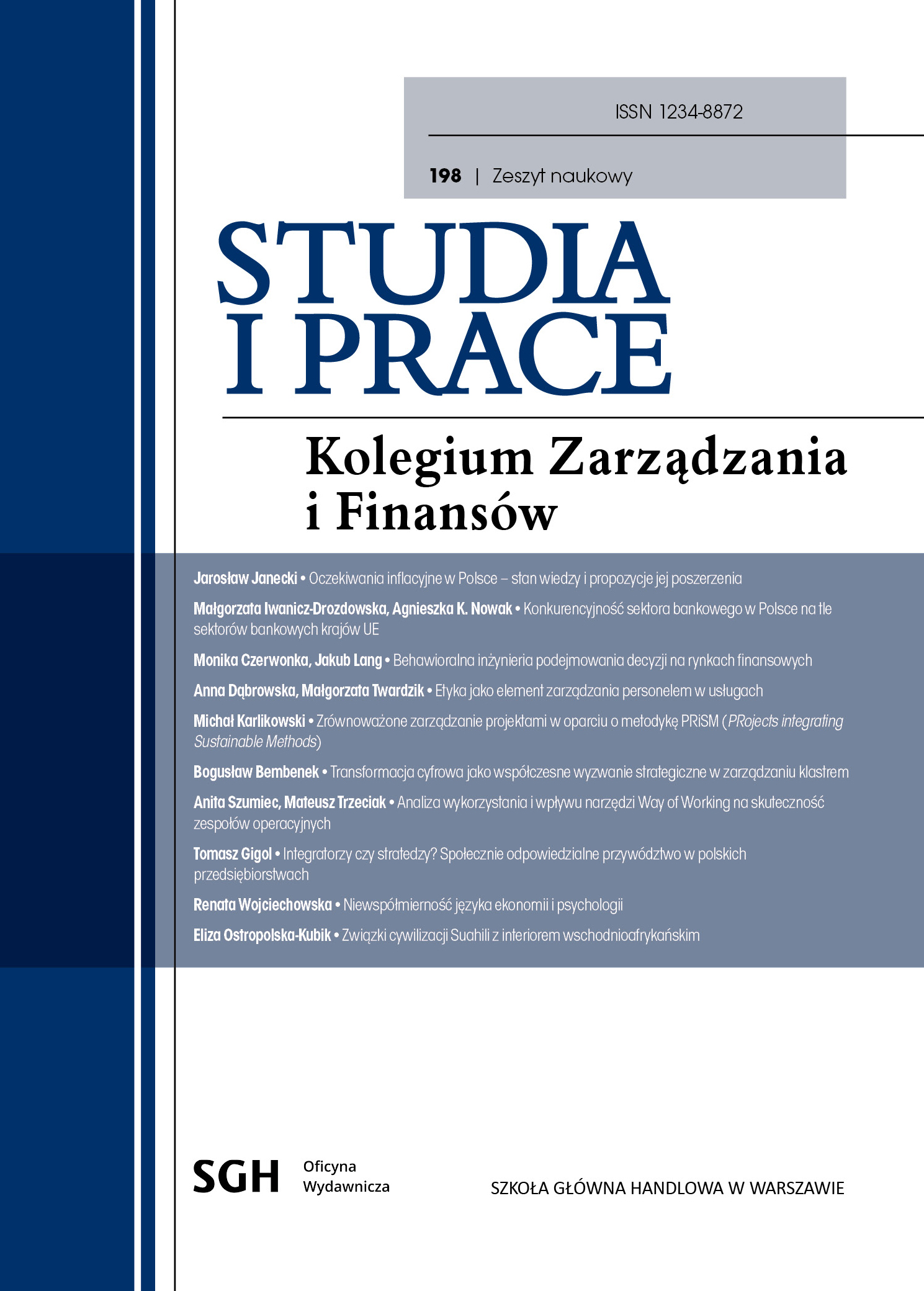Behawioralna inżynieria podejmowania decyzji na rynkach finansowych
DOI:
https://doi.org/10.33119/SIP.2024.198.3Keywords:
rationality, perception, cognitive reflection, heuristicsAbstract
The purpose of this article is to present the behavioural dimension of decision-making. In order to understand how information is selected, preferences are established, and finally decisions are made, it is necessary to review the factors that influence this process. The concept of the dual-process theory of information processing becomes crucial. The article introduces the topic of decision-making with a focus on factors such as emotions, perception, and the disposition to choose the mode of information processing in the decision-maker’s brain. The authors refer to the theory of behavioural economics as well as to contemporary research using related disciplines such as psychology and neuroscience. The paper provides examples showing the consequences of the dual-process theory of information processing by decision-makers in financial markets.
Downloads
References
Wydawnictwa zwarte
Czerwonka, M. (2019). Behawioralne, kulturowe i etyczne uwarunkowania podejmowania decyzji inwestycyjnych. Warszawa: Oficyna Wydawnicza SGH.
Dennett, D. (1997). Kinds of Minds:Toward an Understanding of Consciousness. New York: Basic Books.
Ekman, P. (2012). Emocje ujawnione. Gliwice: Helion.
Epstein, S. (1998). Cognitive-experiential Self-theory: A Dual-process Personality Theory with Implications for Diagnosis and Psychotherapy. W: Empirical Studies of Psychoanalytic Theories, Vol. 7. Empirical Perspectives on the Psychoanalytic Unconscious (s. 99–140), F. R. Bornstein,
M. J. Masling (Eds.). Washington: American Psychological Association.
Evans, T. B. S. J, Frankish, K. (2009). In Two Minds: Dual Processes and Beyond. Oxford: Oxford University Press.
Goleman, D. (2007). Inteligencja emocjonalna. Poznań: Media Rodzina.
Jia, Y., Simkins, B. J., Xu, Z., Zhang, R. (2023). Psychological Anchoring Effect, the Cross Section of Cryptocurrency Returns, and Cryptocurrency Market Anomalies, https://ssrn.com/abstract=4170936 (dostęp: 21.06.2024).
Ohme, R. (2017). Emo sapiens. Harmonia emocji i rozumu. Warszawa: Bukowy Las.
Perkins, N. D. (1995). Outsmarting IQ: The Emerging Science of Learnable Intelligence. New York: Free Press.
Popper, K. (2016). Logika odkrycia naukowego. Warszawa: Aletheia.
Salovey, P., Mayer, J. (2005). Czym jest inteligencja emocjonalna? W: Rozwój emocjonalny a inteligencja emocjonalna, P. Salovey, D. Sluyter (eds.). Poznań: Rebis.
Shiller, R. (1997). Human Behavior and the Efficiency of the Financial System W: Handbook of Macronomics, vol. 1 (s. 1305–1340), J. B. Taylor, M. Woodford (Eds.). London: Elsevier.
Shiller, R. (2015). Irrational Exuberance. New Jersey: Princeton University Press.
Simon, H. (1976). Działanie administracji. Proces podejmowania decyzji w organizacjach administracyjnych. Warszawa: PWN.
Simon, H. (1996). The Sciences of The Artificial. London: MIT Press.
Stanovich, K. (2009). Distinguishing the Reflective, Algorithmic, and Autonomous Minds: Is It Time for a Tri-process Theory? W: In Two Minds: Dual Processes and Beyond, T. B. S. J. Evans, K. Frankish (Eds.). New York: Oxford University Press.
Stanovich, K., West, R., Toplak, M. (2016). The Rationality Quotient. Toward A Test of Rational Thinking. Cambridge: MIT Press.
Stephan, E., Becker, J., Willman, M. (2001). How to Explain the Anchor Effect: Theoretical Models, Current Debates, and Some New Insights. W: Environment and Wellbeing. Proceeding of the IAREP 2001 Conference, A. J. Scott (Ed.). Bath: University of Bath.
Stephan, E., Keil, G. (2000). Decision Processes in Professional Investors: Does Expertise Moderate Judgment Biases? W: Fairness and Competition. Proceedings of the IAREP/SABE Conference, E. Hüzl (Ed.). Vienna: WUV Universtatsverlag.
Werneryd, E. K. (2001). Stock-Market Psychology. How People Value and Trade Stocks. Cheltenham: Edward Elgar Publishing.
Artykuły naukowe
Adamczyk, M. (2020). The Impact of Ratings and Other Information on the Fluctuation of Polish Stock Indexes, Bank i Kredyt, 51 (3), s. 239–262.
Adelman, C. (1993). Kurt Lewin and the Origins of Action Research, Educational Action Research, 1 (1), s. 7–24.
Einhorn, J. H., Hogarth, M. R. (1981). Behavioral Decision Theory: Processes of Judgement and Choice, Annual Review of Psychology, 32, s. 53–88.
Epstein, S. (1994). Integration of the Cognitive and the Psychodynamic Unconscious, American Psychologist, 49 (8), s. 710–711.
Evans, T. B. S. J, Stanovich, K. (2013). Dual-Process Theories of Higher Cognition: Advancing the Debate, Perspectives of Psychological Science, 8 (3), s. 223–241.
Evans, T. B. S. J. (2008). Dual-processing Accounts of Reasoning, Judgment, and Social Cognition, Annual Review of Psychology, 59, s. 255–278.
Gurdgiev, C., O’Loughlin, D. (2020). Herding and Anchoring in Cryptocurrency Markets: Investor Reaction to Fear and Uncertainty, Journal of Behavioral and Experimental Finance, 25, 100271.
Lewin, K. (1947). Frontiers in Group Dynamics: Concept, Method and Reality in Social Science; Social Equilibria and Social Change, Human Relations, 1 (5), s. 6–41.
Oakhill, V. J., Johnson-Laird, N. P. (1985). The Effects of Belief on the Spontaneous Production of Syllogistic Conclusions, The Quarterly Journal of Experimental Psychology, 37A, s. 553–569.
Owusu, S. P., Laryea, E. (2023). The Impact of Anchoring Bias on Investment Decision-making: Evidence from Ghana, Review of Behavioral Finance, 15 (5), s. 729–749.
Perkins, N. D. (1985). Postprimary Education Has Little Impact on Informal Reasoning, Journal of Educational Psychology, 77, s. 562–571.
Simon, H., Newell, A. (1962). Computer Simulation of Human Thinking and Problem Solving, Monographs of the Society for Research in Child Development, 27 (2), s. 137–150.
Simon, H, Newell, A. (1964). Information Processing in Computer and Man, American Scientist, 52, s. 281–300.
Simon, H. (1955). A Behavioral Model of Rational Choice, The Quarterly Journal of Economics, 69 (1), s. 99–118.
Simon, H. (1967). Motivational and Emotional Controls of Cognition, Psychological Review, 74 (1), s. 32–33.
Simon, H. (1979). Information Processing Models of Cognition, Annual Review of Psychology, 30, s. 363–396.
Sloman, S. (1996). The Empirical Case For Two Systems of Reasoning, Psychological Bulletin, 119 (1), s. 3–22.
Stephan, E., Keil, G. (2017). Decision Processes in Professional Investors: Does Expertise Guard Against Judgmental Biases?, Zeitschrift für Arbeitswissenschaft, 71, s. 142–156.
Thaler, R. H. (2015). Misbehaving: The Making of Behavioral Economics, Public Choice, 164, s. 185–188. 20. Tversky, A., Kahneman, D. (1986). Rational Choice and the Framing of Decisions, Journal of Business, 59, s. 251–278.
Downloads
Published
How to Cite
Issue
Section
License
Copyright (c) 2024 Studies and Work of the Collegium of Management and Finance

This work is licensed under a Creative Commons Attribution 4.0 International License.









